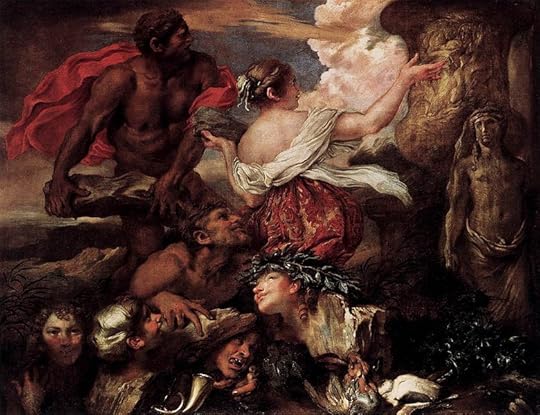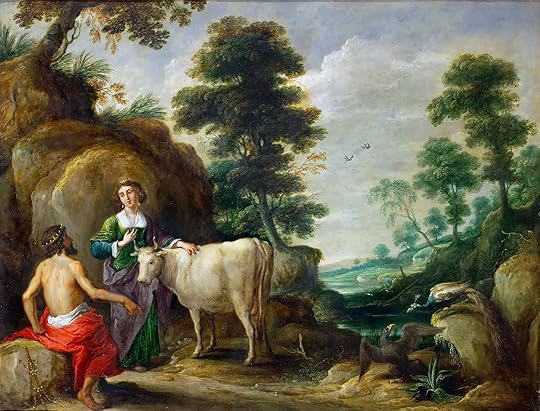 Kalliope’s
Comments
(group member since Aug 28, 2018)
Kalliope’s
Comments
(group member since Aug 28, 2018)
Kalliope’s
comments
from the Ovid's Metamorphoses and Further Metamorphoses group.
Showing 541-560 of 610
 Images on Deucalion and Pyrrha (that reminds us of Noah).
Images on Deucalion and Pyrrha (that reminds us of Noah).Rubens. 1636/7. Prado.

Giovanni Maria Bottala, c 1635. Rio Janeiro.

Giovanni Benedetto Castiglione. 1655. Berlin Gemäldegalerie.

 Roman Clodia wrote: "I think the implication is that this, like the Daphne story, is an aetiology or origin myth i.e. that Lycaon i..."
Roman Clodia wrote: "I think the implication is that this, like the Daphne story, is an aetiology or origin myth i.e. that Lycaon i..."Thank you.. that would explain why we have so quickly jumped into some of the myths...
 Roman Clodia wrote: "Is Jupiter's destruction of the entire race of man a warranted intervention in response to the act of Lycaon alone? ('its impetus sprang from a single body and source. But now I am forced to commit the whole race of mankind to destruction') - or is it a form of imperialist over-reaction? A whole race condemned and annihilated for the actions of a single individual.."
Roman Clodia wrote: "Is Jupiter's destruction of the entire race of man a warranted intervention in response to the act of Lycaon alone? ('its impetus sprang from a single body and source. But now I am forced to commit the whole race of mankind to destruction') - or is it a form of imperialist over-reaction? A whole race condemned and annihilated for the actions of a single individual.."Exactly... I was baffled.. and it also made me think of the whole of humanity damned by Adam and Eve's action.
 Roman Clodia wrote: "Lycaon
Roman Clodia wrote: "LycaonWhat did everyone make of the Lycaon story?
I'm always struck by how contemporary it seems as a tale of political expediency on the part of Jupiter, and a narrative that justifies actions..."
Excellent, RC, I had just been wondering about Lycaon... Another confusing part for me.
I do not see the connection between the bad experience with this Arcadian and the need to destroy humanity.
My edition points to the fact that what was insulting in the banquet was the mixing of sacrifice with cannibalism.
And, RC, I was going to ask about the political references to Augustus and to the attempts, or success, in assassinating Caesar (Julius or the Emperor?).
Was the Met completely written before Ovid was sent into exile?
My edition also suggests there may be a stint at the Senate in the way all the gods are yeasayers to Jupiter/Augustus.
 I am attending a Seminar on Dutch art lately and we were discussing Goltzius and how hugely important and widely circulated were his prints. He later devoted himself to painting.
I am attending a Seminar on Dutch art lately and we were discussing Goltzius and how hugely important and widely circulated were his prints. He later devoted himself to painting.Here is his transformation of Lycaon into a wolf (I think the Greek word for wolf is very close to this name, does anyone know?)

 I found the beginning confusing and the excellent Notes of my edition (Simpson) have helped me out.
I found the beginning confusing and the excellent Notes of my edition (Simpson) have helped me out.They separate the Cosmogony, that make an unidentified god as responsible. This Cosmogony is the first metamorphosis, and it has its basis in Stoic teaching.
And then there is a jump in narrative logic, and this created universe appears in the hands of the usual mythological suspects.. Jupiter et al.
What I found strange too is that the Silver Age begins when Saturn goes down to the underworld and Jupiter takes over... So, Jupiter is not the one in command during the Golden Age.
Or so I see it.
 Roman Clodia wrote: "Peter wrote: "Even the idea of a single creator god ("opifex rerum") is present in his text."
Roman Clodia wrote: "Peter wrote: "Even the idea of a single creator god ("opifex rerum") is present in his text."opifex is an interesting word choice here, isn't it, as it usually means 'workman' so has connotations..."
My edition emphasises the role of the 'maker' seen as the artist... and quotes an essay in an Academic publication that elaborates this idea.
Wheeler, Stephen M. "Imago Mundi: Another View of the Creation in Ovid's Metamorphoses", in American Journal of Philology 116 (1995), 95-121.
 Jasmine wrote: "If you are interested in Ovid's life and work I recommend Katharina Volk's Ovid which is a pretty good introduction and a quick read."
Jasmine wrote: "If you are interested in Ovid's life and work I recommend Katharina Volk's Ovid which is a pretty good introduction and a quick read."Thank you, Jasmine. I will look into it and will add it to the Group Shelves.
 Thank you, Peter, Czarny and Fit for your insights from such different angles.
Thank you, Peter, Czarny and Fit for your insights from such different angles.I enjoyed your comments.. the scientific aspect, the mixing of the myth traditions and the laurel leaf for delicious dishes...
 For Roger and Peter...
For Roger and Peter...The Prado Museum has been offering discussions of individual paintings, in Latin.
Some of these paintings will, I think, come up as we proceed with the Met, so they they will be posted at the appropriate time, but you may enjoy listening to these (short) presentations in Latin.
I have no idea if the pronunciation are correct (I had just two years of Latin) but I guess they ought to be not too far off, because of the very open vowels in the Spanish language.
Here are a few.
https://www.youtube.com/watch?v=p6Va1...
https://www.youtube.com/watch?v=8OxdE...
https://www.youtube.com/watch?v=_UI0l...
There are many more... Just type Museo Prado Latin and you will get them....
 Roger wrote: "By the way, nobody has answered my question about why, rape or not, Jupiter's women all seem to enjoy it?..."
Roger wrote: "By the way, nobody has answered my question about why, rape or not, Jupiter's women all seem to enjoy it?..."Because a man wrote it?
 Roman Clodia wrote: "I know! Marcus Agrippa (Augustus' friend and supporter) was supposed to have made a map that showed the 'icy zones' but sadly it never survived. We tend to think of maps descending from the medieva..."
Roman Clodia wrote: "I know! Marcus Agrippa (Augustus' friend and supporter) was supposed to have made a map that showed the 'icy zones' but sadly it never survived. We tend to think of maps descending from the medieva..."This is excellent information, RC. Thank you.
But we still have not answered Roger's question about what the 5 zones in the sky/heaven correspond to.
I have no idea.
 Ce Ce wrote: "On a personal note, I am reading Met in the middle of the Atlantic Ocean...days from land. We have been skirting inclement weather for 3 days so my bed is rocking and rolling as I curl up with Mand..."
Ce Ce wrote: "On a personal note, I am reading Met in the middle of the Atlantic Ocean...days from land. We have been skirting inclement weather for 3 days so my bed is rocking and rolling as I curl up with Mand..."Poseidon must be with you..
 Fionnuala wrote: "Has anyone posted Giulio Romano's depiction of the War of the Giants in the Palazzo del Te, Mantova?
Fionnuala wrote: "Has anyone posted Giulio Romano's depiction of the War of the Giants in the Palazzo del Te, Mantova? This is the Garth translation of the scene which fits so well with Romano's frescos.
(I'm read..."
Fio, would you believe that I have been if I told you that I did not think of G Romano's magnificent room because instead the Furies came to my mind (I had been looking through a catalogue on Titian's) and the Titans, and tried to sort them all out in my mind.
When I was in the Giants room in Mantua I even felt that I had to raise my arms to try and stop those columns falling on me...
:)
 Roger wrote: "Thanks for those two pictures, Kalliope and Fionnuala. I did not include the Teniers in my own selection, feeling it was altogether too insipid for the story; you would think that Juno and Jupiter ..."
Roger wrote: "Thanks for those two pictures, Kalliope and Fionnuala. I did not include the Teniers in my own selection, feeling it was altogether too insipid for the story; you would think that Juno and Jupiter ..."Oh, I like the Teniers...For one, I have been looking at his work lately and also. And two, I find it humorous... There is Juno acting the innocent and putting her husband in a difficult position. Notice she is standing, coyly but in command, showing how much she appreciates this cow as her new pet, while he is sitting in a somewhat defensive manner... The powerful Jupiter...
I think the viewer becomes almost Juno's accomplice.
 Depictions of Io as a heifer/cow can get confused with those of Europa.
Depictions of Io as a heifer/cow can get confused with those of Europa.Here is David Teniers's version of Io:

1638. In the KHM.
 What I am finding very disconcerting is how Ovid moves from one story to another.. I am trying to find the 'logic'... The Daphne is introduced because of the laurel wreath substituting 'any leaves' for the crown awarded in the Pythian games.
What I am finding very disconcerting is how Ovid moves from one story to another.. I am trying to find the 'logic'... The Daphne is introduced because of the laurel wreath substituting 'any leaves' for the crown awarded in the Pythian games. The jump to Io is less clear.
 Roman Clodia wrote: "
Roman Clodia wrote: "But can we delineate and separate the two quite so strictly in Ovid's telling? What about the similes that liken Apollo to a hunter chas..."
It certainly is more palatable than Io's... but apart from what you point out, RC, even the Cupid's act could be seen as hubris (deserved punishment?) to Apollo's cockiness.
But in support of Roger's view, Daphne acquiesces to her being also now immortal in her form as a laurel-wreath.
 Roger wrote: "Kalliope, here is a very rough translation of the Garcilaso de la Vega sonnet you posted (#58). Tell me if it comes even close. I know it is far from literal, but I did try to keep the rhythm and t..."
Roger wrote: "Kalliope, here is a very rough translation of the Garcilaso de la Vega sonnet you posted (#58). Tell me if it comes even close. I know it is far from literal, but I did try to keep the rhythm and t..."This is wonderful, Roger... I would not have even attempted a literal translation.
I shall keep it.
Thank you.

